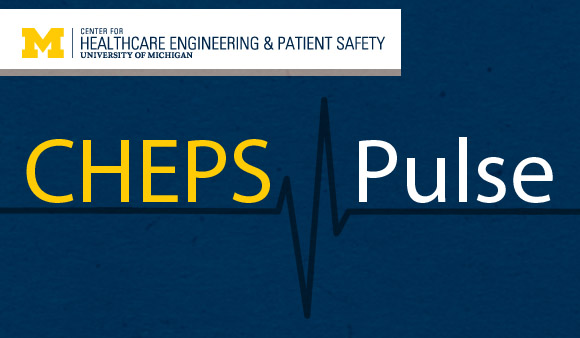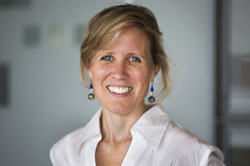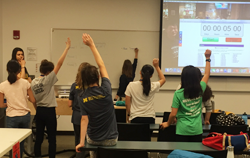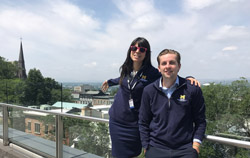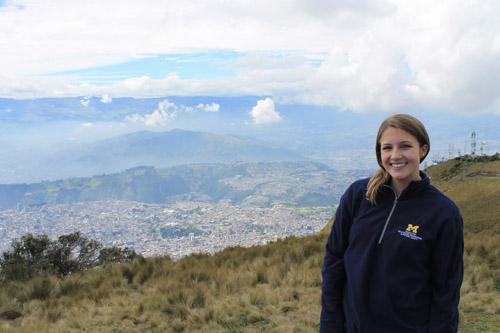In This Issue
Message From Amy Cohn, CHEPS Associate Director
Inspiring Young Minds
Engineering the Future of Healthcare
Collaborations: IHPI
Goodbye to Summer
News & Events
Where in the World Is CHEPS
Message From Amy Cohn, CHEPS Associate Director
Hello, Everyone!
I love the start of every new semester at CHEPS, but I think I like fall best of all! Fall not only means the same new beginnings that make every semester exciting – new students joining us, new projects to tackle, new classes to teach – but also a new seminar series and symposium to look forward to. As I write this, we’ve already had five great seminars on diverse topics ranging from treating TB to how nurses develop trust in robots. And plans for the symposium are well underway, with a great line-up of posters, presenters, and of course pastries (thanks to Gene Kim, who ensures that we are always well-fed at all CHEPS events!).
Even more than these new beginnings, though, I look forward to the fall for the chance to connect with our alums. The highlight of this, without question, is the pre-symposium Friday night celebration at Conor O’Neills, with many of our former students returning to Ann Arbor to share stories of their successes, give guidance to our current students, show off photos of themselves in exotic locales sporting their CHEPS fleeces, and just reconnect with old friends.
But even beyond this, the fall is a time where lots of students just stop by to say hello when in town for a football game, or come by during the recruiting fair, or arrange to present a lunch-and-learn for our current students. Students who graduated last spring start to send notes and emails about their summer travels or how they’re settling into their new jobs. Students who have been out for a few years are starting to achieve notable successes and take on leadership at their new institutions, are sharing exciting personal news about engagements, new homes, expanding families. And others begin requesting letters of recommendation as they prepare to return back to school for additional degrees.
I have been told by our students, over and over again, that the thing they love best about CHEPS is the sense of community and the people that they have met and worked with and, most of all, developed friendships with. I agree whole-heartedly! I eagerly await more emails, more visits, and a huge turnout for the Friday Night Reunion!
Go CHEPS and GO BLUE!
Amy
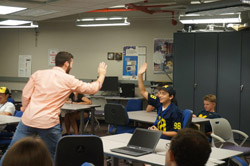 Inspiring Young Minds
Inspiring Young Minds
One rewarding aspect of being involved with CHEPS is the opportunity to help get the younger generation interested in the work we do here. Students at CHEPS often participate in outreach activities to inspire and educate middle school and high-school-aged students about how they can be a part of improving healthcare in the future. This summer, CHEPS students worked with students at events like Discover Engineering and Girls in Science and Engineering (GISE) summer day camp here at the University.
The Discover Engineering event gave students between 8th and 10th grade the opportunity to learn more about different engineering majors. CHEPS Junior Bassel Salka took the lead in organizing and instructing the session of the program that introduced students to Industrial and Operations Engineering. Participants in the session discussed examples of IOE in the real world, completed the Resident Shift Scheduling Game, and completed a mini-lesson on optimization methods.
The residency shift scheduling game demonstrates the use of operations modeling and linear programming to efficiently create a schedule for medical residents. It demonstrates both how complicated scheduling problems can be and how effective industrial engineering tools can be for solving them. CHEPSters Dale Mallette and Anna Learis helped out with the event by guiding the students through the game and answering any questions the students had. “I loved seeing how excited the kids became when they learned about the different aspects of IOE and saw its effect on their daily lives,” Anna said.
The GISE program is a week-long day camp for girls who have just completed 7th or 8th grade and are interested in science and engineering. Participants meet women engineers and scientists at the University and engage in exciting activities to learn about the science fields. One of these activities, the Emergency Department (E.D.) simulation, is a fun and active way for the girls to learn about the basics of Industrial and Operations Engineering (IOE).
CHEPS students, along with other engineering student volunteers, helped run the simulation and talk to the campers about engineering. They began with a brief presentation that gave the girls a broad definition of what an engineer is and provided some examples of real-world cases in which engineering is used. The girls were also introduced to a few basic IOE terms, such as “objective,” “constraint,” and “bottleneck.”
The girls were given roles: a triage nurse, an E.D nurse and physician, a lab technician, a hospitalist, a transporter, and patients. They were then told the rules and objective of the E.D. simulation, the latter being to get as many healthy patients as possible leaving the E.D. in five minutes. During the first round, the girls quickly became acclimated to their roles and were eager to have a well-running E.D. However, it became apparent that the current setup of the hospital had major drawbacks and was extremely chaotic. The girls paused to brainstorm ways to get more patients through the emergency department in the next round. They then voted on the change they thought would have the greatest impact on their E.D. and set off on round two to beat their previous number of discharged patients.
The campers grew very committed to making their E.D. run smoothly and effectively. The second round of the simulation ran much better than the first, and the third was the best. Each time, more healthy patients were discharged from the hospital and the girls were proud for beating their previous record. Not only did the campers have a blast and feel rewarded for their work in the E.D. simulation, they learned several fundamental principles of IOE and saw how they were used in a real-world example. One camper noted “I didn’t realize that industrial operations engineering could be used in so many different scenarios, like in a hospital. This game was fun, too!”
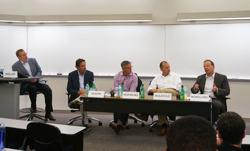 Engineering the Future of Healthcare
Engineering the Future of Healthcare
On Thursday, June 8th, as part of the CHEPS Healthcare Executive Summit: Engineering the Future of Healthcare, CHEPS hosted four healthcare executives for a panel titled, “Envisioning the Future of Healthcare.” The panel was facilitated by James Molloy, a managing director at Citi Global Markets and IOE alumnus. The panel included Todd Hofheins, Former CFO at Providence Health & Services, Michael Hulefeld, COO at Ochsner Health System, Elliot Joseph, CEO at Hartford Healthcare, and Scott Nordlund, EVP Partnership, Growth & Innovation at Select Medical Corporation. Students, faculty, and industry professionals gathered to discuss issues currently challenging the healthcare industry and how industrial and operations engineering skills can be applied to the healthcare space.
The conversation began with some stage setting as the panelists discussed the history of the US’s reimbursement scheme and how this has driven operations and strategies of our healthcare systems. In a fee for service model, cost of services, value, quality, and consumer desires are not the motivators; organizations have been financially rewarded for volume, increasing throughput as much as possible. However, there has been a shift away from volume, towards value. Insurance companies are restructuring payment models to reimburse for services that are high quality and appropriate. Irrespective of political party, the industry agrees that healthcare is too expensive and the focus must be on keeping people healthy. These basic truths are encouraging organizations to focus on no-regret strategies, those that will support the business regardless of current policy changes. As Michael Hulefeld said, “Despite federal uncertainty, there are things that are just the right thing to do… we have to get costs down and improve safety, supporting patients across their care continuum.”
The conversation then shifted into variation across states and even within different local markets as Todd Hofheins discussed the variations he has seen through Providence’s markets. Provider recruitment, Medicare and Medicaid reimbursement models, the commercial plans’ market shares, even the density of consumers will have geographical differences. To be successful, an organization must understand these differences and adapt their strategies accordingly. Health systems must also react to the increasing consumer empowerment and organizations must deliver on cost and quality transparency demands.
As the event came to a close, the executives discussed the utility of a degree from the University of Michigan and provided advice to students as they entered their careers. Jim Molloy emphasized the importance of process-oriented thinking and how crucial sound statistics are. Scott Nordlund said, “There’s a ton of data, but no one knows how to use it effectively and strategically. Managing data and information is going to be just as important as managing patients.”
Each panelist stressed the importance of teamwork. As engineers, we will never be as knowledgeable about the clinical aspect of care as the clinical providers; therefore, it’s really important to work with the clinicians to understand the processes before putting together solutions. Luckily that’s one thing we do really well at CHEPS, working with multidisciplinary teams to develop innovative solutions! Elliot Joseph left the audience with one last piece of advice, something that we don’t often touch upon in our engineering curriculum as much as we should. He said, “Learn the art and science of change management. You can have all of the insights but without the softer, change management skills, you may never be able to effect change.”
As the participants filed out of the lecture hall, moving over to the reception area, you could feel the excitement in the air. At the reception, many project teams shared their research on posters which generated a great deal of discussion and excitement.
On Friday, panelists from the Healthcare Summit were invited back to the Lurie Engineering Building to speak with CHEPS students and staff. While enjoying the delicious breakfast, attendees happily discussed the previous day’s Summit and the panelists were given the opportunity to learn more about CHEPS and its ongoing projects. Scott Nordlund, one of the panelists, couldn’t help but comment on how great of an opportunity CHEPS is for University of Michigan students to get involved in healthcare management. After the breakfast, Bassel Salka, a pre-med student in IOE commented, “It was such a privilege to spend quality time with such accomplished professionals. I have never been more enthused about healthcare.”
Healthcare may be complicated, but it is full of opportunity. Those with an ability to systematically work through the complexities have a chance to make a real contribution to the industry, ultimately impacting people during their most vulnerable moments. Students at the University of Michigan have so many resources to cultivate the skills necessary to be successful within the healthcare industry. It will be exciting to see what the next generation of Wolverines is able to accomplish!
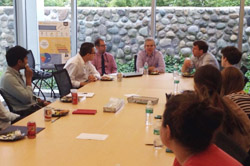 Collaborations: IHPI
Collaborations: IHPI
The Institute for Healthcare Policy and Innovation (IHPI) has been a valued collaborator of The Center for Healthcare Engineering and Patient Safety since CHEPS’ inception. Both IHPI and CHEPS take a multidisciplinary approach toward solving healthcare’s biggest challenges, and work to implement and disseminate solutions in ways that have real-world impact.
IHPI is the nation’s leading university-based institute of health services researchers evaluating how healthcare works and how it can be improved, and advising policy makers to inform change. IHPI brings together more than 500 investigators from U-M’s top-ranked schools of medicine, nursing, public health, engineering, social work, law, business, and public policy, among others. Its researchers collaborate across dozens of focused teams to improve the quality, safety, equity and affordability of healthcare services.
CHEPS students and faculty benefit greatly from collaboration with IHPI and vice versa. “IHPI provides our students and our faculty with resources to understand policy and to have a voice in that sphere,” says CHEPS Associate Director Amy Cohn, who has also served in IHPI’s Institute Leadership Team since its inception. “When we come up with a great idea for how an engineering solution could be implemented in healthcare, IHPI can provide perspective on questions like how do we articulate our ideas in Washington? How do we motivate people to implement change? How do we publish our work in clinical journals for broader dissemination?”
“For what we’re doing to get implemented in a real world setting might require policy changes to happen, and so we have to be aware of that and we have to position our work and clearly explain our work to policymakers. IHPI helps us do that.”
CHEPS, in turn, can help put the implications of proposed policy decisions into a broader context, Cohn says, by bringing in tools and expertise to help predict consequences and outcomes. “If decision makers are coming up with policy ideas aimed at fixing a problem, we bring in the systems perspective to say, ‘But when you make the change that you’re proposing, how is it going to work through the system to connect all of these other things? If you change this aspect, here’s how things will be affected for better or worse.’ And, in turn, we provide a new perspective to people in IHPI, specifically non-engineers in IHPI, about the way we look at problems.”
One CHEPS-IHPI collaboration is focusing on the training of residents in transplant surgery as a way to examine the role unpredictability plays in the hospital environment. Taking a systems approach, they are examining diagnostics and training protocols in order to build processes and simulation tools that anticipate and counteract human error in both teaching and practice.
Like CHEPS, IHPI is dedicated to preparing the next generation of leaders and innovators in improving healthcare, and offers a number of opportunities for U-M students and trainees at all levels and across all disciplines to broaden their knowledge and skills in research and policy, from Residential Massive Open Online Courses, to lunch and learn sessions, to health services research seminars.
U-M faculty who are engaged in health services research and wish to join IHPI’s membership are invited to apply for consideration.
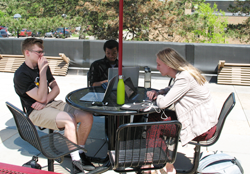 Goodbye to Summer
Goodbye to Summer
We’re excited to be in the midst of fall term but summer is always a special time in CHEPS. CHEPS students shared what they enjoyed most about summer 2017 at the Center for Healthcare Engineering and Patient Safety.
“Although this was my last summer at CHEPS, it was a great one. Working alongside all of the new students and showing them how multidisciplinary work can impact healthcare was a pleasure. Being able to come in day after day with no other priorities (besides enjoying the sunshine!) during the summer allows students to get the most out of their time and be productive all day. Having students of all different years and majors working together creates for some interesting and funny moments and conversations in the workroom, which is refreshing! Wouldn’t have wanted to spend my last summer any other way!” – Hassan Abbas, Nursing
“I really enjoyed getting to know every student at CHEPS this past summer. I made some great friendships and I was able to learn a lot about other projects that I wasn’t on. During the school year, it is much harder to form these relationships because students aren’t gathered at CHEPS all day every day from 9-5 and there is much less socializing/collaboration. It is really nice going into the fall semester having a summer at CHEPS under my belt and great friendships. The CHEPS community is one of a kind!” – Lauren Hirth, Biomechanical Engineering
“What I love about CHEPS during the summer is how much time we all get to spend together! Without class and other yearly obligations, it gives the staff much more free time to get together after hours for some fun activities with coworkers. CHEPS Thursdays specifically.” – Trevor Hoffman, Industrial and Operations Engineering
“I love spending my summers at CHEPS not only because of the engaging projects but also the family of students. They manage to make summers in an empty college town extremely enjoyable. Moving ahead into the new semester, I’m so excited to continue my work with the aviation and resident call scheduling projects! I feel as though I learn new skills in every meeting I’m in at CHEPS and that’s an opportunity not many people are lucky to have.” – Anna Learis, Industrial and Operations Engineering
“A fun memory for summer (that we still do now) is that everytime Bassel and I see each other we always compliment each other. Once during the summer, some of us went to play some sand volleyball after work and for trash talk me and Bassel just hurled compliments at each other. It was actually rather entertaining!” – Dale Mallette, Computer Science
“This summer was a fantastic opportunity to get to know fellow CHEPS students and really dive into meaningful work we do. The school year is always so busy and different schedules make it more difficult to get to know students outside of your project teams. Spending most days at the center with all the students really encouraged relationship development. These friendships made me even more excited to continue the work in the fall!” – Andrea McAuliffe, HEPS Masters
“In broad strokes, this past summer was incredibly valuable to me as I continue to think about what kind of job I want to get within the computer science field. The projects I worked on were immensely satisfying because I could see how what I was doing benefited the university’s healthcare system–too often thus far in my undergraduate career I’ve felt like I was just doing something that didn’t feel terribly necessary or like I was helping anyone all that much. This summer has been one of the first times I haven’t had to fight that feeling.
As you’ll probably hear from everyone for this, the people were awesome, funny, and inclusive. I think that starts with the sort of environment Amy has created here, and it made for fun, lively days.
One example that comes to mind is the snark jar–which Amy semi-seriously brought up at the summer kickoff as a way to make sure everyone was being nice to each other. Naturally, one day we began joking about how snarky we were being to each other and quickly began compiling a list of debts owed due to that, dinging each other 25 cents in whatever way we could think of. To this day the whiteboard in the workroom still prominently features that list (of course, there are many ancient lists on the whiteboards at CHEPS). Surprisingly, no one wanted to pony up actual cash for this, so the list was as far as we got. Little amusements like that were huge in making work not feel so much like work this summer.” – Ian McKenzie, Computer Science and Engineering
“Working at CHEPS in the summer is a particularly unique experience for me because, as a Master’s student, I was able to get a taste of what it would be like to work as an industrial engineer in a hospital setting — working forty hours a week on meaningful projects that will affect real departments in the hospital!” – Rachel Moeckel, HEPS Masters
“My experience at CHEPS this summer is something that I will never forget. Not only did I get to see the skills that I am learning in the classroom used in real-world applications, I also got to meet new people of all different majors and build lasting friendships.” – Justin Rogers, Industrial and Operations Engineering
“In the workroom I sometimes looked around from my work and found a ton of kids around me all working diligently without anyone saying a word. That feeling of unity and determination of everyone working on a common goal was very special.” – Bassel Salka, Industrial and Operations Engineering
“The greatest part about being at CHEPS over the summer was being a part of an active research community. Even while most things around campus run a little slower in the summer, CHEPS is in full gear with student teammates engaged and excited to tackle projects.” – Adam VanDeusen, Industrial and Operations Engineering
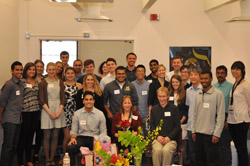 Recent News
Recent News
Lisa Prosser Seminar
Xi Jessie Yang Seminar
Grisselle Centeno Seminar
HEPS Student Dinner
Sharon Johnson Seminar
Joseph Cicchese Seminar
Fall Kick-Off Meeting
Mariel Lavieri named Richard Wilson Faculty Scholar
Adam VanDeusen Lunch & Learn
2017 INFORMS Healthcare Conference
Discover Engineering
2017 IFORS Conference
Upcoming Events
2017 Seminar Series
2017 Symposium on Healthcare Engineering & Patient Safety, Monday, 11/6 at 5pm
Where in the World is CHEPS
CHEPS student and IOE undergraduate Anna Learis is pictured atop a volcano overlooking Quito, Ecuador!
See more Where in the World is CHEPS.
CHEPS Newsletter contributors are: Lauren Hirth (BME undergraduate student), Andrea McAuliffe (HEPS Masters student), Bassel Salka (IOE undergraduate student), Elizabeth Fisher (staff).

